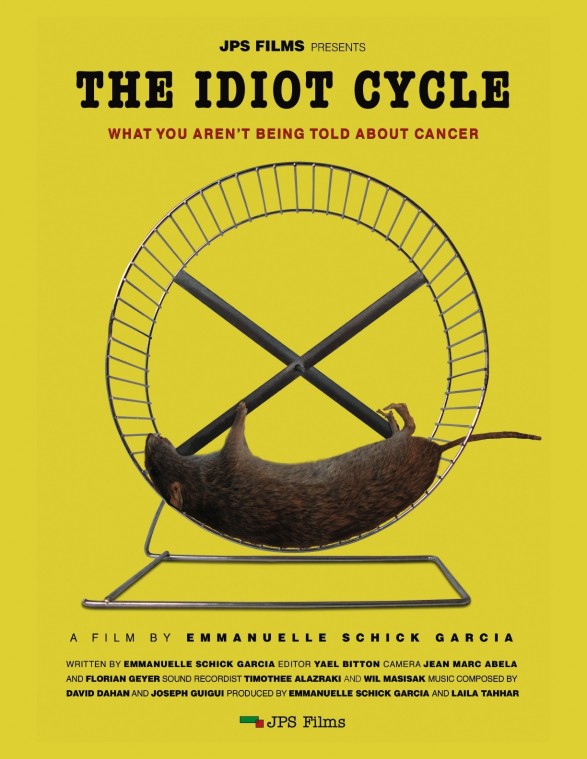Documentary examines cancer, exposes chemical giants
Idiot Cycle :?The Idiot Cycle,? a documentary on how corporations profit from both making chemicals that cause cancer and selling the drugs that treat it, held its first U.S. screening Tuesday in the University Union.:Courtesy Photo
December 8, 2010
Sacramento State and Dark Cinemas of Corvallis, Ore., held the first screenings of the award-winning and controversial documentary “The Idiot Cycle,” on Tuesday night in the University Union’s Valley Suite, as a one-time free event. It was the documentary’s first screening in the United States.
The documentary, created by UCLA and film school alumna Emmanuelle Schick Garcia, addresses the reasons for the modern-day epidemic of cancer and reveals how chemical companies profit from both making chemicals that cause cancer and then from selling the drugs that treat it.
Elizabeth Martinez, vice president of the Environmental Student Organization at Sac State and senior government major, was responsible for obtaining rights to screen the film. She said the film shows the poor quality of everyday products and consumption in goods that surround us everyday, items like cosmetics, toothpastes and plastics.
The documentary is banned in the United States because it was denied an Errors and Omissions insurance due to its “subject matter.”
The insurance is necessary to ensure a film is safe from lawsuits, if a television or theater chooses to air it, Garcia said.
Garcia began researching to create the film five years ago, when she was inspired by the death of her mother.
“My mother was diagnosed with breast cancer at age 49, which initially started my investigation into what had caused it,” she said.
Garcia said when it comes to cancer, most people want to talk about treatments and research because they want to look for hope and a way to fight it.
“I wanted to know why we ignore the causes, and certainly why governments don’t make it a requirement to have long-term health testing on synthetic chemicals and genetically modified organisms before they are licensed,” she said.
The film focuses on the stories of cancer patients, as well as six major companies who allegedly took part in and benefited from creating and treating cancer. These include Dow Chemical, Bayer, BASF, Monsanto, DuPont and AstraZeneca.
Marie-Paule Aspe of Japanese Pop Songs Films, a french film company that recently picked up the documentary, said these companies have also been part of why the film has not yet been shown in the United States. Recently, a school director at the University of Montpeiller in France cancelled a screening of the film after he heard the school’s sponsor BASF was cited in the film, she said.
Garcia said instances like this often happen. Many universities have corporate sponsors and the sponsors’ influence on the students’ education is usually not evident until someone does some research that is not good for the sponsors’ business, she said.
Then comes a moment students realize they are not at the university to be a student and learn subjectively, Garcia said.
Garcia said she encourages students to be aware of the conflicts of interests that may exist at their schools, for they may have direct links in the cause of the cancer epidemic or other ones as well.
She said students can become more aware by inquiring about who gives research funds to their universities, how this affects what does and does not get funded, and in turn, how this affects the students’ education. She said asking questions would allow them to analyze and think more critically about what they are learning while preparing for their future jobs.
“In the past year I’ve been invited to present the film at a number of universities – University of Oxford, University of Oslo, etc. and I think the most important thing is to create dialogue and have the students think outside their specialties,” she said. “Their job, no matter what it is, will have consequences on the world around us, and certainly how to be aware of that.”
Garcia said students whom she has met have been trying to voice their concerns about the issues brought up in the film.
But while some students want their voices heard, others may still be hesitant about it.
“It’s hard for debt-ridden students to say no to a good-paying salary. You never think you are going to be part of a company that makes people sick, and you think that you can change that company for the better if that’s the case,” she said. “Unfortunately, as history shows, these companies don’t fundamentally change very much.”
Garcia said many of these companies are paying for a lot of scholarships, so students are usually grateful and professors are even consultants for companies.
While Garcia does not see anything wrong with corporations helping fund schools, she does want to see that they are doing it legitimately.
“I’m not against corporations; I’m against companies that have been making people sick for decades,” she said. “When is that going to be regarded as criminal?”
Martinez said she is not aware of any such issues with Sac State donors, but said she would not be surprised to find there was since it occurs so often. Even schools that are thought to be progressive like UC Davis, are influenced by companies like Monsanto, she said.
Martinez said addressing the issues in this film is the most effective way to fight the battle against cancer.
“I appreciate people getting excited and participating in runs for cancer and wearing their pink shirts in an effort to fight cancer, but in order to truly fight cancer people need to understand what it is exactly that’s causing it,” she said.
Students are becoming a new class of consumers so it is important for them to know the harm of the products they use or buy so they do not make themselves sick like so many have, Martinez said.
MiriamArghandiwal can be reached at marghandiwal@statehornet.com.
































































































































